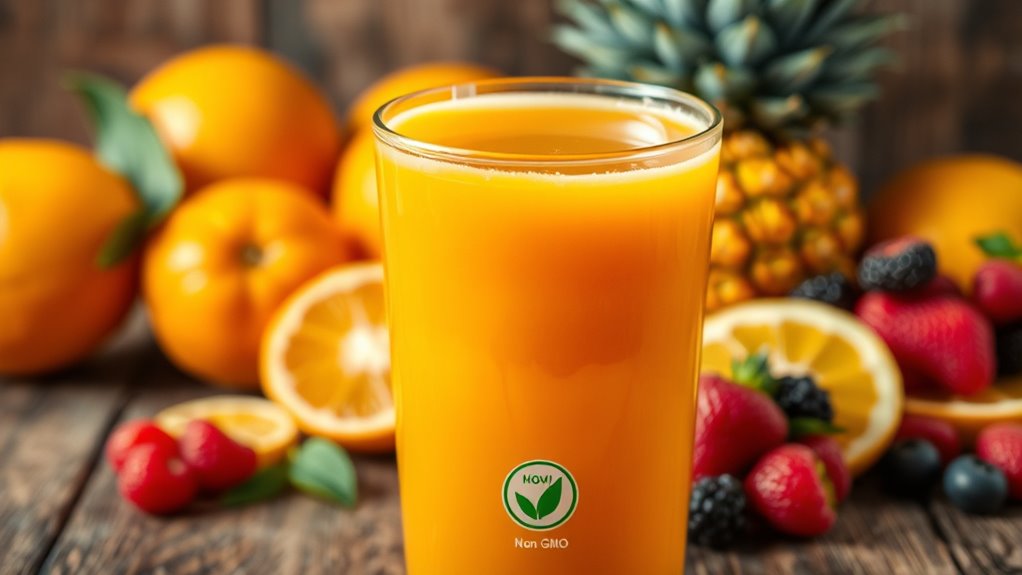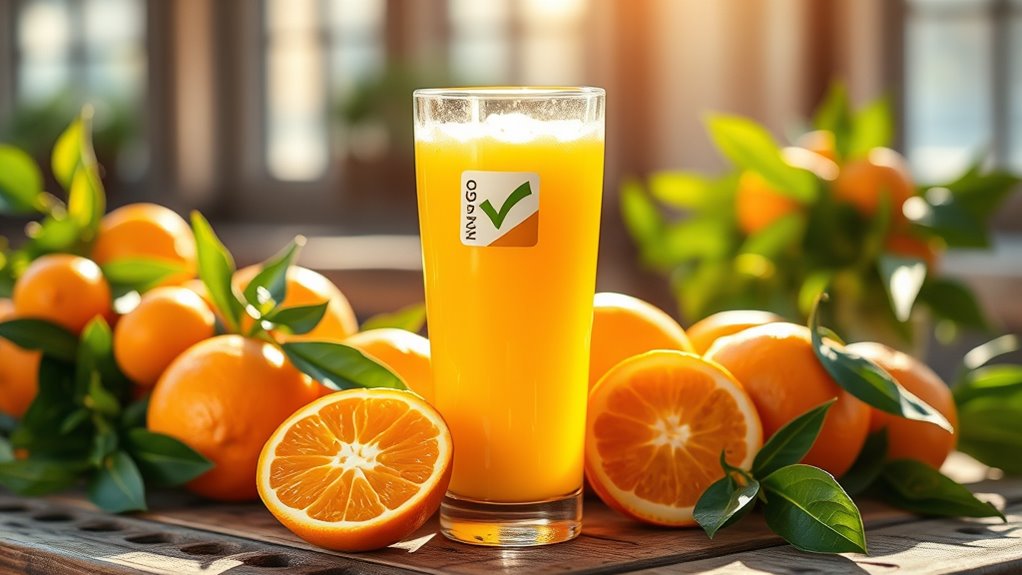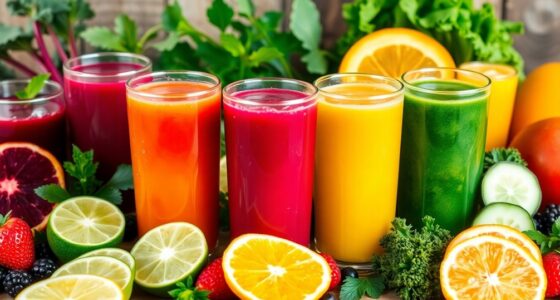When choosing non-GMO juices, look for certified organic labels from trusted organizations like USDA Organic, which verify that the ingredients meet strict non-GMO standards. Check ingredient lists for transparency and avoid products with artificial additives or hidden GMOs. Reputable certifications and clear sourcing info help confirm product integrity. If you keep these points in mind, you’ll be better equipped to select genuine non-GMO juices, and you’ll discover even more tips as you explore further.
Key Takeaways
- Look for certified organic labels from reputable organizations like USDA Organic, indicating non-GMO standards.
- Check ingredient lists for transparency, ensuring no artificial additives or GMOs are included.
- Verify sourcing information and farm practices to confirm natural, non-GMO ingredient origins.
- Seek products with third-party verification or audit seals for added assurance of non-GMO claims.
- Choose brands committed to transparency and clear labeling to easily identify genuine non-GMO juices.

Choosing non-GMO juices means you’re opting for beverages made without genetically modified ingredients, guaranteeing a more natural and pure product. When shopping for these juices, one of the most reliable indicators of quality is organic certification. Certified organic juices are produced following strict standards that prohibit the use of genetically modified organisms. This certification assures you that the ingredients meet specific guidelines, giving you confidence that the juice is genuinely non-GMO. Keep an eye out for labels from recognized organizations, such as USDA Organic or equivalent certifying bodies in your region. These certifications are important because they not only confirm the absence of GMOs but also guarantee that the product was grown without synthetic pesticides, fertilizers, or artificial additives.
Ingredient transparency is another pivotal factor when choosing non-GMO juices. Brands that prioritize transparency openly list all ingredients on their packaging and provide detailed information about their sourcing practices. This transparency allows you to verify that the juice contains only natural, non-GMO fruits or vegetables, and that no artificial flavors, preservatives, or unnecessary additives have been added. When you see clear, straightforward ingredient lists, it’s easier to make an informed decision and avoid products that may contain hidden GMOs or questionable ingredients. Some brands go a step further by sharing information about their sourcing farms, farming practices, and certification processes, which builds trust and reassures you of the product’s integrity. Incorporating quality assurance measures such as audits and third-party verification can further strengthen your confidence in the product’s non-GMO status.
Frequently Asked Questions
Are All Organic Juices Automatically Non-Gmo?
Not all organic juices are automatically non-GMO, but most are. Organic farming standards prohibit the use of genetically modified organisms, and products often carry GMO labels if they contain GMOs. To verify your juice is non-GMO, check for organic certification and look for GMO-free labels. Organic juices generally come from crops grown without synthetic pesticides or GMOs, making them a good choice if you’re avoiding genetically modified ingredients.
How Can I Verify Non-Gmo Claims on Juice Labels?
Think of the label as a window into the juice’s soul. To verify non-GMO claims, you need to check for symbols like the Non-GMO Project Verified seal, which signifies label accuracy. Also, read the ingredient list carefully—transparency is key. If you’re unsure, visit the brand’s website for third-party certifications and detailed info, ensuring you’re truly choosing a product aligned with your values.
Do Non-Gmo Juices Taste Different From Conventional Ones?
You might notice some flavor differences in non-GMO juices, but they often come down to ingredient transparency and how the juice is processed. Non-GMO juices tend to have a more natural taste because they avoid certain additives or artificial flavors. However, taste varies by brand and product. If you prefer a cleaner, more authentic flavor, opting for non-GMO options can make a noticeable difference, especially when you compare side by side.
Are Non-Gmo Juices More Affordable Than GMO Options?
Is the cost difference between non-GMO and GMO juices significant? Not necessarily. You might find that non-GMO juices are slightly more expensive, but it depends on the brand and quality. To make an informed choice, do a price comparison and consider if the extra cost aligns with your values. Remember, investing in non-GMO options often means supporting sustainable farming, making it a worthwhile consideration beyond just price.
What Certifications Indicate a Juice Is Non-Gmo?
You should look for certifications like the Non-GMO Project Verified label, which clearly indicates non-GMO status. GMO labeling also helps you identify non-GMO juices, especially if the label states “non-GMO” or “GMO-free.” Certification standards set by organizations guarantee the product meets strict non-GMO criteria, giving you confidence in your choice. Always read labels carefully to confirm the juice aligns with non-GMO standards.
Conclusion
Now that you know what to look for in non-GMO juices, the choice is yours. Will you stick to familiar brands or explore new options that prioritize your health? Remember, the labels can be tricky, and not all non-GMO claims are equal. The next sip could be a game-changer—are you ready to uncover the secrets behind your favorite juices? Stay vigilant, because your health deserves nothing less than transparency.









